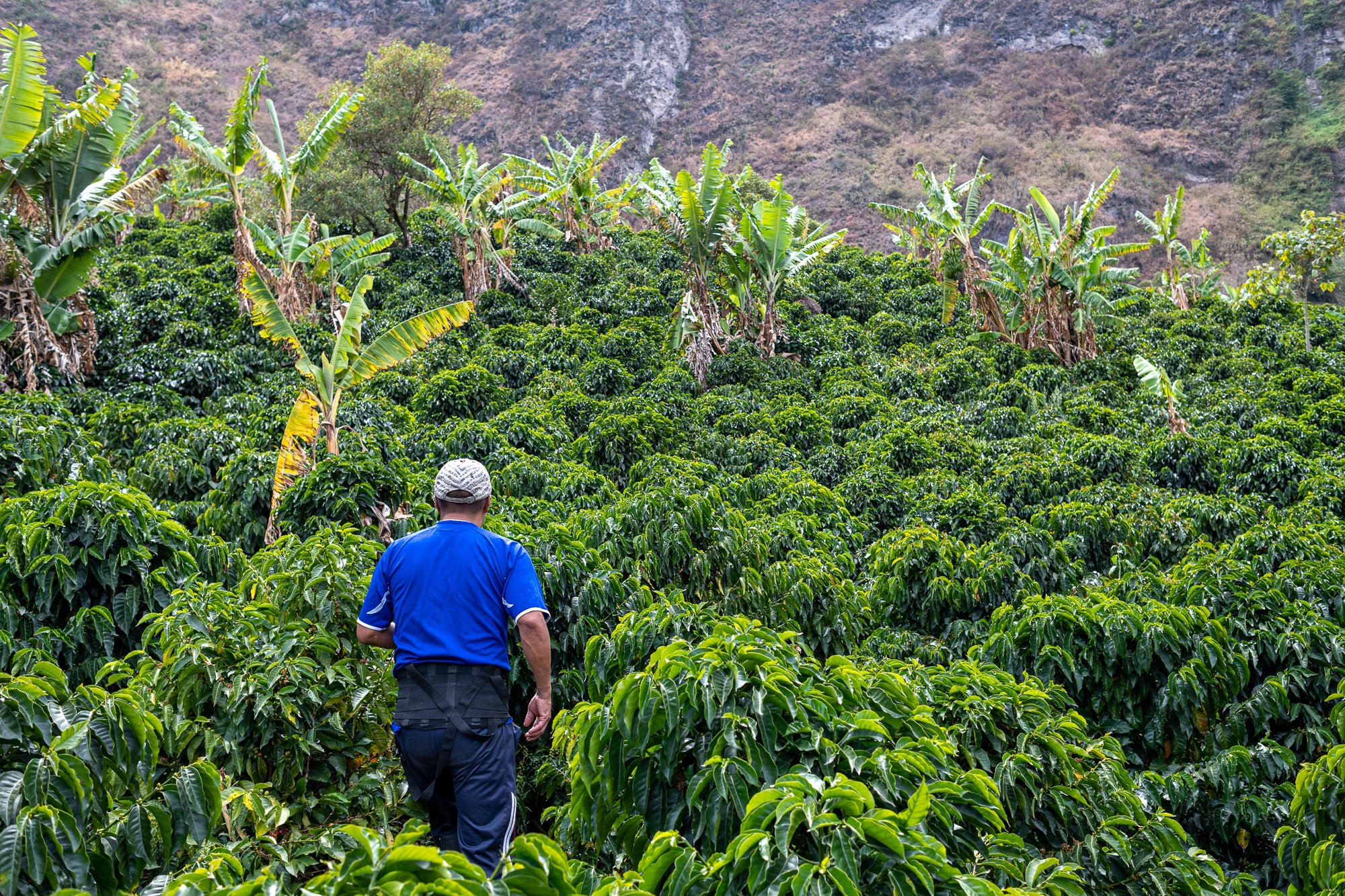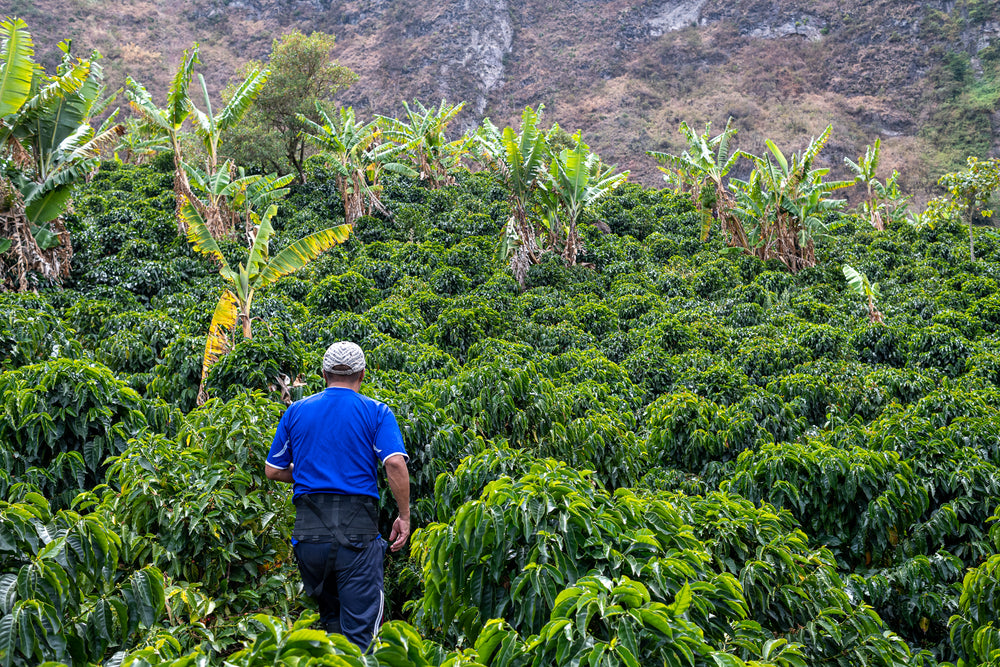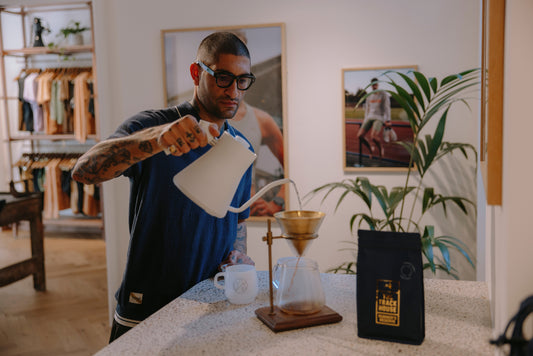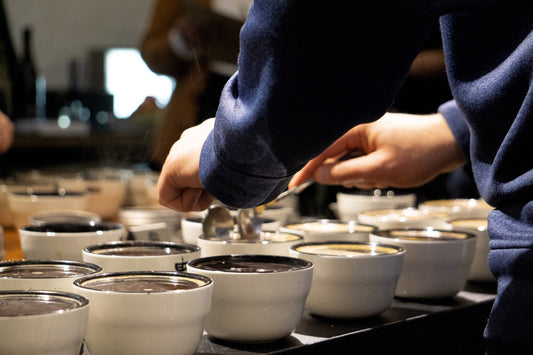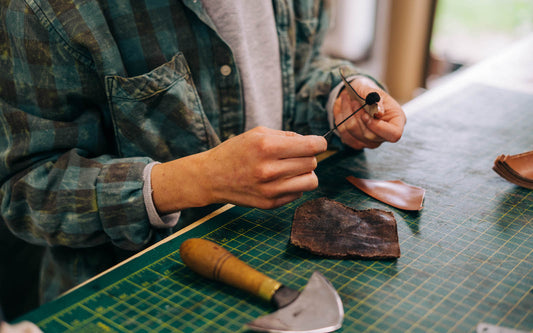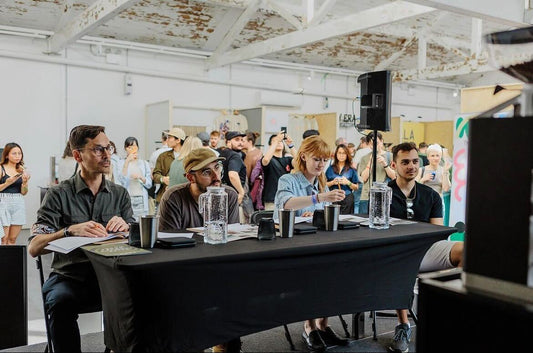People should enjoy coffee with friends.
At Workshop, we always take a moment together to appreciate coffee grown halfway around the world by the producers we work with; made all the more delicious if shared, we suggest you do the same.
But what if some friends are also the ones who introduce you to those incredible coffees you purchase? It's harder to maintain relationships when 5,000 miles and the Atlantic Ocean lie between people, but when you do finally meet again, it's even better.
 Salomé Puentes chats to producer, Fabio Artunduaga - Pitalito, Huila.
Salomé Puentes chats to producer, Fabio Artunduaga - Pitalito, Huila.
Origin travel sounds like the dream to most and in many ways it is. Visiting the tropics, meeting producers, tasting and selecting delicious coffees, it can be pretty idyllic. However, the life of a coffee buyer is not perfect. On the bumpiest of roads for hours at a time, with anti-social start times resulting in supremely long days and the ever-present risk of stomach problems, all pale into insignificance compared to the loneliness experienced in remote hotel rooms and on long journeys. Being away from home and those you love hurts the most, so when those with you become more than just business associates, it dispels many moments you could feel alone.
 Iliana Delgado Chegwin and Jairo Muñoz from Azahar Coffee - Yacuanquer, Nariño.
Iliana Delgado Chegwin and Jairo Muñoz from Azahar Coffee - Yacuanquer, Nariño.
My relationship with the country of Colombia has been precisely that. Salomé Puentes from Caravela and Iliana Delgado Chegwin from Azahar started as guides and translators as I travelled Colombia looking for delicious coffees. Now I call them friends and each visit sees those bonds reinforced; moments of loneliness dispelled, long car rides become a time to talk, play new music and hang out.
To the job in hand then. Coffee.


Starting this trip in Pitalito, Huila with Caravela and Salomé provides a chance to meet producers who supply coffee to the Naranjos Espresso we released in June last year. The first stop is José Hernando Dorado and his niece, Marcela, whose farm straddles the main road to San Agustín, 1°51'25.3"N 76°13'49.0"W.
 José Hernando Dorado and Marcela - San Agustín, Huila.
José Hernando Dorado and Marcela - San Agustín, Huila.
Growing Caturra and Colombia, alongside oranges (Naranjos), cacao, avocado and plantain, José manages the family farm and is currently teaching Marcela the ways of farm management and processing. Utilising washing channels to help remove the less dense beans, they ferment for around 24hr before transferring to the drying facilities José plans to rebuild in the coming months.


As with every farm visit, coffee is served. In most cases, the producer's own coffee, over-roasted and served already containing sugar, I struggle it down. Not here. Marcela, using a cloth filter, brews the best farm coffee I've ever experienced. Roasted by José in San Agustín on a hired roaster, I instantly message back to London with news of delicious farm coffee, before asking for a second cup and more details.
 Lidier and Nery - Finca El Mirador, Pitalito, Huila.
Lidier and Nery - Finca El Mirador, Pitalito, Huila.


Pitalito, 1°51'02.2"N 76°02'50.7"W, the largest town in Southern Huila, has a population of around 135,000, so there's plenty of places to eat and drink in the evenings. Some good, some not so good, you'll never go hungry and there's always a cold Club Colombia available. Coupled with Stop 44, the bar opposite the Gran Premium Plaza Hotel where I rest my head, there's plenty to do in the evenings after a long day visiting producers.


The handover to Azahar and Iliana takes place in Pitalito, but we don't dwell in Huila. Heading back to Bogota and a quick stay in an airport hotel (depressing and expensive in equal measures), the next day wakes at 04:00 with a flight to Pasto, the capital city of the Nariño department.
An airport runway situated on top of an Andean mountain, flights regularly get turned around and sent back to Bogota. Even when but 10 minutes from landing, the elements can change in an instant as clouds roll in from the Pacific.
The weather holds. So begins Workshop's first visit to Nariño.

We've bought Nariño coffees before, from producers Nectario Pascuaza and Eiver Gomez Melo. Both were outstanding and offered vastly different profiles from coffees we buy from Huila and Tolima. This is a different world to those regions. This is the Andes proper and the impetus for our visit.


Located at 2897m, Pasto, like Addis Ababa in Ethiopia, sees you descend to get to the coffee. Dominating the western skyline sits Galeras, a 4,276m stratovolcano, and currently the most active volcano in all of Colombia. Surrounding Galeras, a relatively new ring road circles the entirety; like a smaller, quieter M25, the distinct risk of eruption at its centre.
As the trip is relatively short, we don't stray far from Galeras, instead visiting a handful of communities that lie just off the ring road. Finca San Javier, owned by Javier de la Rosa, situated at 1° 05'14.9 "N 77° 25'35.3" W, falls under the locality of Yacuanquer.
 Jorge Hernando Morales Daza, farm manager at Finca San Javier - Yacuanquer, Nariño.
Jorge Hernando Morales Daza, farm manager at Finca San Javier - Yacuanquer, Nariño.


Here the ground is fertile but incredibly rocky. I'm in no doubt that growing coffee can be laborious work, but I witness the most back-breaking of all at Finca San Javier. Three workers charged with removing a whole field of coffee trees. Having stripped the trees of leaves and branches, they now start to excavate the resulting bare trunks and remove what they can of the root systems.

Pick-axes and shovels wielded in 33° heat, the striking of volcanic rocks strewn throughout the soil, ring out. Enquiring how long to clear the last of the trees? Two weeks the answer.

Visiting Nariño, I was adamant about experiencing the local dish - Cuy (Guinea Pig). Colombians are under no illusions they are cute, with many soft toy cuys in shops, but that doesn't stop them featuring on the menu. CuyQuer is the place to visit in Pasto, the main dish a whole Guinea Pig, roasted and quartered. Photos sent home of the meal are greeted by a multitude of emotions from friends and family; from outright anger and disgust to somewhat jealousy and many queries as to how it tasted. It really was quite delicious. Would eat again.
Having just approved recent samples from both Caravela and Azahar, we look forward to the arrival of 4,200kg and 3,500kg of coffee from San Agustín and Yacuanquer respectively. Look out for them in the coming months, these will both be roasted for espresso and delicious additions to our range.
Share:


